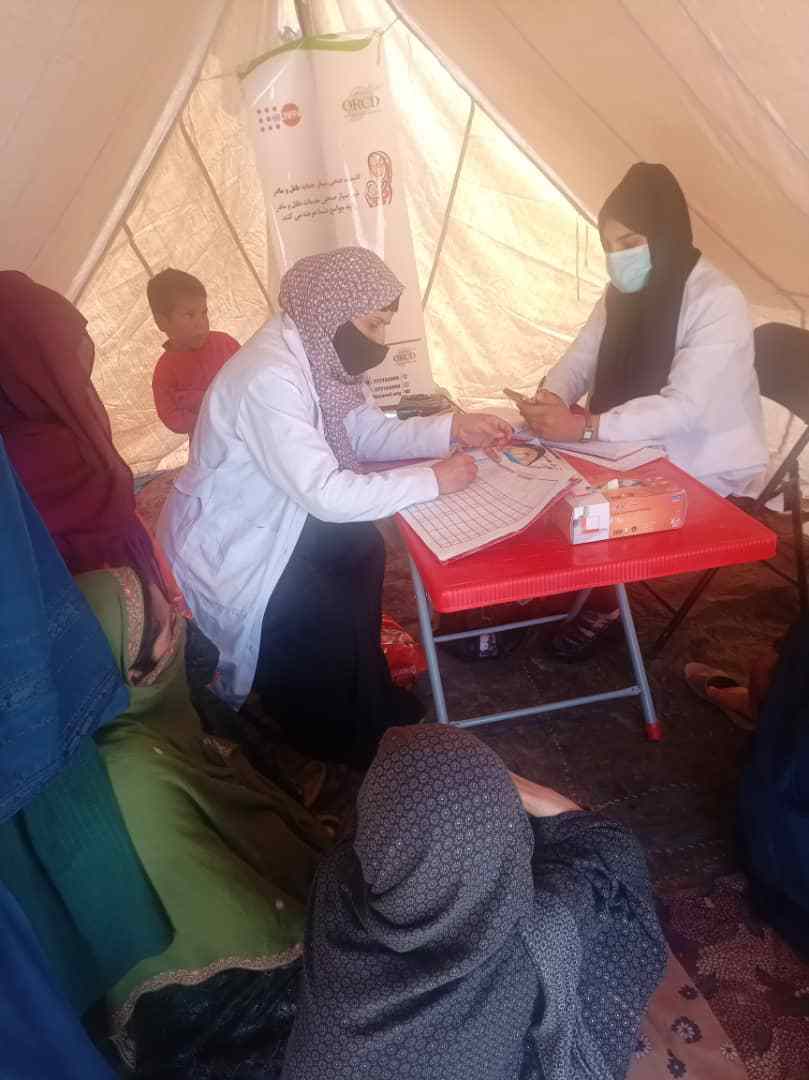News
Emergency maternity care and psychosocial support for women and girls hit by floods in Afghanistan
- 29 May 2024
News
BAGHLAN PROVINCE, Afghanistan – “Women were in shock. They’ve lost their homes, they’ve lost family members.”
Midwife Habiba Danish still vividly recalls the images of the destruction caused by massive flooding that has affected over 60,000 people in northern Afghanistan so far this month. “We had to trek for seven hours and stay overnight on the way to reach Pushta Kaja Village, because the roads were impassable,” Ms. Danish told UNFPA, the United Nations sexual and reproductive health agency.
But what struck her most was the suffering she witnessed among the women she attended to. As they reached the village, the team found a 25-year-old woman who was four months pregnant and in distress.
“Her home had been destroyed, putting her family in a dire situation,” recalled Ms. Danish. “After examining her and administering some medication prescribed by the doctor in our team, I advised her to seek further evaluation from a well-equipped health facility for an ultrasound examination.”

Ms. Danish is part of a UNFPA-supported mobile health team that was immediately deployed to Baghlan province to provide round-the-clock maternal health and psychosocial support to people caught up in the climate-driven crisis.
There are 216 of these teams operating across Afghanistan, providing what are sometimes the only health-care services available for people in rural and hard-to-reach areas. Four of these teams are currently operating for the flood response in Baghlan, composed of a midwife, a doctor, a nurse, a vaccinator and a pharmacist.
A physical and mental health toll
In the weeks that followed, Ms. Danish attended to many others who needed not just maternal health care, but also mental health support. “The women were in shock. They've lost their homes and family members.”
The latest crisis has exacerbated hardships for the local community. The most affected districts are Baghlani Jadid and Burka in Baghlan province, where some 80 per cent of deaths have been recorded. Over 3,000 homes have also been destroyed or damaged in the province, leaving thousands of families displaced and exposed to further risks.
“Women are particularly vulnerable; they're grappling with mental distress and struggling to focus, highlighting the urgency of providing them with critical health services,” Ms. Danish said.
“The maternal health teams are on the ground to provide counselling and help women cope with the shock, anxiety and depression. It is crucial that we stand by them during this time.”
The teams have also been instrumental in facilitating UNFPA-supported health education and counselling sessions for women and girls in the aftermath of the flooding. These sessions cover topics ranging from the importance of prenatal and postnatal care to psychosocial support for survivors.
On the frontlines of the climate crisis
Due to the scattered population and the damage caused to already rough terrain and roads, reaching people in need of assistance has been challenging. Roqia Saberi, a midwife from another mobile health team, explained that since the local health centre in the Shaikh Jalal village, in Baghlani Markazi District, was totally destroyed, many people had nowhere to turn for support. This is where the maternal health team stepped in.
On her first day on the ground, Ms. Saberi attended to more than 20 female patients.
“Nine of them needed antenatal care; two were in the last trimester of pregnancy and both were in shock and fear,” she told UNFPA. “I provided them with clean delivery kits and advised them to seek further support from a well-equipped facility.”
Aside from deploying mobile health teams, UNFPA is working with local partners to distribute dignity kits, containing essentials such as soap, underwear, menstrual pads, and other items such as a torch to navigate dangerous and unlit areas. Tarpaulin sheets and blankets have also been provided to ensure women and girls are protected during harsh weather, as well as for privacy and shelter in displacement settings.
The teams are operated by the Afghan Organization for Research and Community Development and offer non-stop assistance to meet the immediate health needs of women and girls. Supported with funding from the Government of Australia, these frontline health workers were able to swiftly pivot from protracted crisis work to emergency response, saving lives and giving hope to thousands amid the devastation.